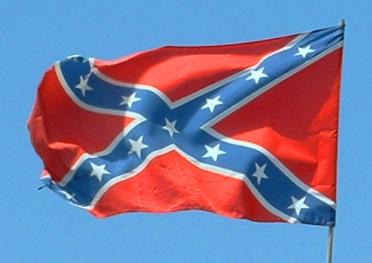Brown: Truth of the Confederate flag, what it represents against U.S. ideals

The Confederate flag in front of the state house in South Carolina was removed July 10.
November 1, 2013
Abraham Lincoln is widely regarded as one of the foremost presidents in U.S. history. His place on our iconic Mount Rushmore would be evidence enough of that even without the imposing monument upon which he sits in our nation’s capitol.
On top of his legendary oratory skills and his commitment to our country despite personal tragedy, Lincoln is credited with preserving our nation throughout its toughest trial: our Civil War. Even after the war, Lincoln led the charge to welcome our Southern brothers back with open arms, disagreeing with the pervading idea that the South should be punished extensively for its transgressions.
It is a terrible indictment on our country that even today there are those who show complete and utter disrespect toward Lincoln, the Union he helped mend and the foundations upon which our nation stands. But just who are these perpetrators?
Anyone ignorant enough to fly the flag of the Confederate States of America.
While the Dixie Flag most of us know was neither the official flag of the Confederacy nor widely popular during the Civil War, it is today universally associated with the secession of the southern states.
Granted, some may not fly or adorn their property and bodies with the rebel flag to show support for actual secession or for the principles upon which that secession was based. Some individuals may think of the flag as representing “southern pride,” “states’ rights” or a host of other — perhaps more sinister — meanings.
Unfortunately for those oblivious enough to think that they can impart upon a flag their own personal meanings, this is just not the case. Flags stand in a relatively small class of idols which transcend personal affiliation. They are flown on high for the exact reason that they do not mean something different to everyone. They represent a single idea, for which there may be many names but is not deviated from in principle.
Having said that, it is equally important to note that the Confederate flag of today is not a beacon of slavery, racism or any other particular interpersonal ideology. The Confederacy was not built upon the notion that people should be able to own other people, and it did not stand upon the idea that any particular race was superior to others.
Yes, those notions absolutely pervaded the Southern states and their citizenry at the time of the Civil War, but the underlying idea that led to secession was that states are independent political bodies, who cannot be coerced by a Union they feel has grown too powerful.
Beliefs about human ownership were certainly at the forefront of discussions as to where the line should be drawn for the Union’s power, but even without that particular disagreement (horrible though it is to even hold such a disagreement) the states were still divided as to what the limits of federal power should be.
It can be understandable that many have romanticized the feelings of rebellion that underscored the Civil War. However, what distinguishes the American Rebel from others is that the United States was not being oppressive to those who rebelled. Unlike the French Resistance in World War II or the Native American battles for freedom, those who rebelled in the Civil War already had a legitimate voice in the government they warred against.
When that voice, which others have killed and died to gain, did not get them what they wanted, instead of accepting the inevitable consequence of living in union with others, they cut themselves from said union and turned that very knife against those who before had embraced them as equals.
Make no mistake, flying the Confederate flag, whether it is on an actual flagpole, a bumper sticker or a T-shirt, advertises to anyone familiar with American history that you do not support our nation as it is now guided by the Constitution. For it is unequivocally a characteristic of the United States of America that our federal government should be both powerful and supreme to the governments of the various states, despite what those who seceded may have said or thought.
If you disagree, you are certainly able to show such feelings by flying the flag of the Confederate States of America, but realize that when you do so, you fly it in the face of our great nation.
You will know that face by the twisted look of disgusted disappointment it shall hold.
















